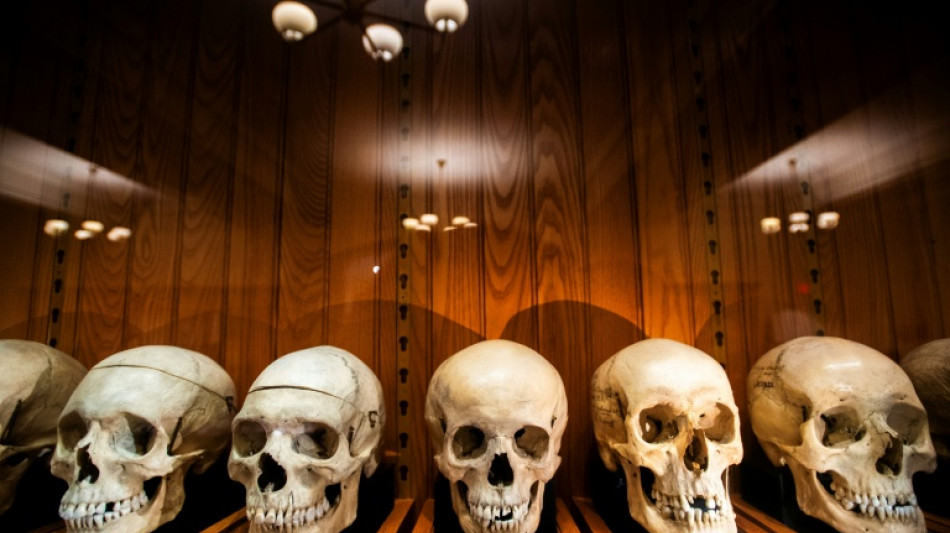
-
 NHL players will compete at Olympics, says international ice hockey chief
NHL players will compete at Olympics, says international ice hockey chief
-
Kohli surpasses Sangakkara as second-highest scorer in international cricket

-
 Young mother seeks five relatives in Venezuela jail
Young mother seeks five relatives in Venezuela jail
-
Arsenal villain Martinelli turns FA Cup hat-trick hero

-
 Syrians in Kurdish area of Aleppo pick up pieces after clashes
Syrians in Kurdish area of Aleppo pick up pieces after clashes
-
Kohli hits 93 as India edge New Zealand in ODI opener

-
 Trump tells Cuba to 'make a deal, before it is too late'
Trump tells Cuba to 'make a deal, before it is too late'
-
Toulon win Munster thriller as Quins progress in Champions Cup

-
 NHL players will complete at Olympics, says international ice hockey chief
NHL players will complete at Olympics, says international ice hockey chief
-
Leeds rally to avoid FA Cup shock at Derby

-
 Rassat sweeps to slalom victory to take World cup lead
Rassat sweeps to slalom victory to take World cup lead
-
Liverpool's Bradley out for the season with 'significant' knee injury

-
 Syria govt forces take control of Aleppo's Kurdish neighbourhoods
Syria govt forces take control of Aleppo's Kurdish neighbourhoods
-
Comeback kid Hurkacz inspires Poland to first United Cup title

-
 Kyiv shivers without heat, but battles on
Kyiv shivers without heat, but battles on
-
Salah and fellow stars aim to deny Morocco as AFCON reaches semi-final stage

-
 Mitchell lifts New Zealand to 300-8 in ODI opener against India
Mitchell lifts New Zealand to 300-8 in ODI opener against India
-
Iran protest death toll rises as alarm grows over crackdown 'massacre'

-
 Malaysia suspends access to Musk's Grok AI: regulator
Malaysia suspends access to Musk's Grok AI: regulator
-
Venezuelans await release of more political prisoners, Maduro 'doing well'

-
 Kunlavut seals Malaysia Open title after injured Shi retires
Kunlavut seals Malaysia Open title after injured Shi retires
-
Medvedev warms up in style for Australian Open with Brisbane win

-
 Bublik powers into top 10 ahead of Australian Open after Hong Kong win
Bublik powers into top 10 ahead of Australian Open after Hong Kong win
-
Sabalenka fires Australian Open warning with Brisbane domination

-
 In Gaza hospital, patients cling to MSF as Israel orders it out
In Gaza hospital, patients cling to MSF as Israel orders it out
-
New protests hit Iran as alarm grows over crackdown 'massacre'

-
 Svitolina powers to Auckland title in Australian Open warm-up
Svitolina powers to Auckland title in Australian Open warm-up
-
Keys draws on happy Adelaide memories before Australian Open defence

-
 Scores of homes razed, one dead in Australian bushfires
Scores of homes razed, one dead in Australian bushfires
-
Ugandan opposition turns national flag into protest symbol

-
 Bears banish Packers, Rams survive Panthers playoff scare
Bears banish Packers, Rams survive Panthers playoff scare
-
'Quad God' Malinin warms up for Olympics with US skating crown

-
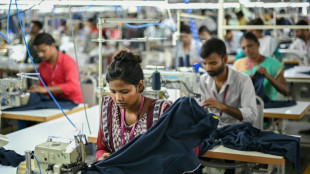 India eyes new markets with US trade deal limbo
India eyes new markets with US trade deal limbo
-
Syria's Kurdish fighters agree to leave Aleppo after deadly clashes

-
 New York's Chrysler Building, an art deco jewel, seeks new owner
New York's Chrysler Building, an art deco jewel, seeks new owner
-
AI toys look for bright side after troubled start

-
 AI pendants back in vogue at tech show after early setback
AI pendants back in vogue at tech show after early setback
-
Grateful Dead co-founder and guitarist Bob Weir dies aged 78

-
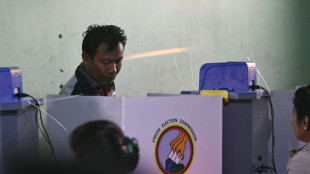 Myanmar votes in second phase of junta-run election
Myanmar votes in second phase of junta-run election
-
'One Battle After Another' heads into Golden Globes as favorite
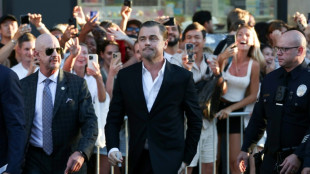
-
 Rams survive Panthers scare to advance in NFL playoffs
Rams survive Panthers scare to advance in NFL playoffs
-
Rallies across US after woman shot and killed by immigration agent

-
 Egypt dump out holders Ivory Coast as Nigeria set up AFCON semi with Morocco
Egypt dump out holders Ivory Coast as Nigeria set up AFCON semi with Morocco
-
Rosenior salutes 'outstanding' start to Chelsea reign

-
 Maduro loyalists stage modest rally as Venezuelan govt courts US
Maduro loyalists stage modest rally as Venezuelan govt courts US
-
Byrne late penalty fires Leinster into Champions Cup last 16 after 'ding-dong' battle

-
 Rosenior makes flying start as Chelsea rout Charlton in FA Cup
Rosenior makes flying start as Chelsea rout Charlton in FA Cup
-
Rallies across US against shooting of woman by immigration agent

-
 Salah closer to AFCON glory as Egypt dethrone champions Ivory Coast
Salah closer to AFCON glory as Egypt dethrone champions Ivory Coast
-
O'Neil ends 'crazy three days' with Strasbourg cup canter
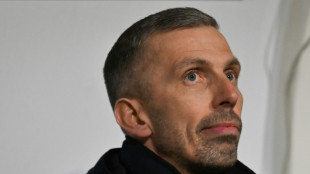

Unnamed skeletons? US museum at center of ethical debate
For years, a man's giant intestine was anonymously on display at a US medical museum in Philadelphia, identified only by his initials JW.
Today, the donor display for Joseph Williams depicts not only his anatomical record, but his powerful life story.
After two years of controversy over how to ethically exhibit human remains, the Mutter Museum announced last week it has changed its policy to "contextualize" and de-anonymize its collection.
"The issue isn't whether we should or shouldn't exhibit human remains," said Sara Ray, the museum's senior director of interpretation and engagement.
"But rather, can we do so in a way that does justice to these individuals and their stories as we trace the history of medicine, bodily diversity, and the tools and therapies developed to treat them?"
Founded in 1963 from the personal collection of local surgeon Thomas Mutter, the museum is now home to 35,000 items, including 6,000 biological specimens. Visitors can view a vast medical library with human skulls, wax moldings of skin conditions, medical tools and more.
Under its new policy, the museum will only accept donations from living donors or from their descendants, to help identify them.
In 2020, a heart transplant recipient donated his old enlarged heart to the collection.
The organ, the size of a soccer ball, now floats in a jar next to a collection of 139 human skulls amassed by a 19th century Austrian anatomist.
- Postmortem Project -
In 2023, after a change of leadership, the Mutter launched the Postmortem Project, a two-year public engagement initiative to re-examine its collection and debate the ethics of displaying human remains.
As part of the reevaluation, the museum deleted hundreds of videos from its YouTube channel, which has over 110,000 followers, as well as a digital exhibition from its website.
"That's when the controversy started," recalls the Mutter's former director Kate Quinn, who initiated the project. "They were internal conversations that became very prominent in the public sphere after the videos were removed from YouTube."
She added: "We didn't want to dramatically change the museum. That was never the intent. The intent was to bring people into the conversation and bring us along this journey as we're trying to figure it out."
The museum's annual Halloween party, known as Mischief at the Mutter, was also cancelled.
The backlash was swift.
A former director of the museum published a scathing op-ed in the Wall Street Journal, condemning "cancel culture" and accusing "a handful of woke elites" of jeopardizing the museum's future.
Soon, an activist group called Protect the Mutter, was formed. Its petition calling for Quinn's ouster garnered more than 35,000 signatures.
"The online content (was) just being decimated, and the staff changes and events," an organizer at Protect the Mutter told AFP on condition of anonymity.
Upset about the controversy, the heart transplant patient had at one point asked for his heart back before the museum made changes.
- 'Did these people choose to be there?' -
Along the corridors of this two-story brick building, visitors can see the cast figures of two adult Siamese twins or study small fragments of Albert Einstein's brain.
They can also learn about the lives of Ashberry, the woman with dwarfism, and Williams, whose "megacolon" was 8 feet (2.4 meters) long. A typical human colon is about 5 feet long.
Similar controversies have also rocked several other Western institutions, such as the British Museum, in recent years, which anthropologist Valerie DeLeon says is part of a broader conversation on ethics.
Museum goers "are thinking about the people that are represented in those collections. And you know, did these people choose to be there? Are they being exploited by having their skeletal remains on display for 'entertainment'?" DeLeon told AFP.
Quinn left her post this spring and the museum's new management moved to restore 80 percent of the videos on its YouTube channel, a decision welcomed by members of Protect the Mutter.
But more difficult questions remain, like what to do with the skeleton of a 2.29-meter giant who cannot be identified.
The anonymous Protect the Mutter activist believes it should be displayed.
"Let this example of acromegaly be respectfully displayed and help future generations better understand an ongoing condition that continues to affect people every day," the activist said.
"It becomes that acknowledgment, instead of erasing the past."
B.AbuZeid--SF-PST



